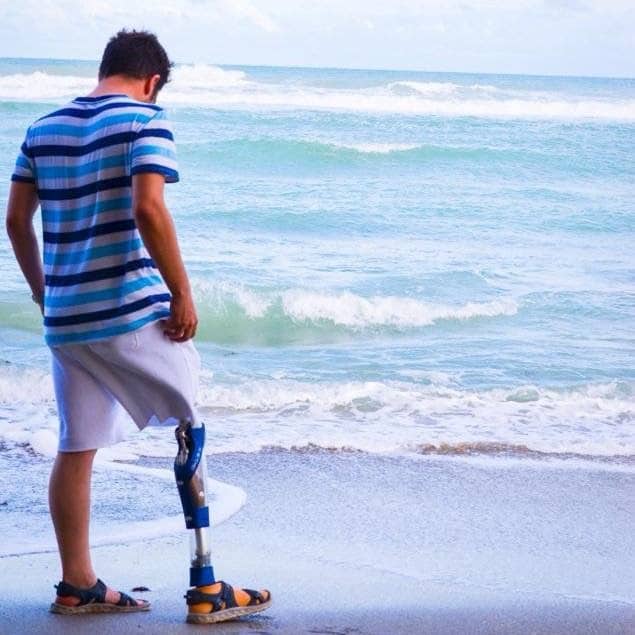 Never Stop Fighting for You
Never Stop Fighting for You
My name is Sean Donnelly. I was born without my right leg, above the knee, due to amniotic bands. The following is my story, which I hope will provide hope, strength, and courage to others out there who live with physical disabilities.
I was born in Boston, Massachusetts. The doctors did not get to deliver the 10 fingers and 10 toes conversation to my mother, after my birth. Rather, they told her that I was missing my right leg, from the thigh down. She knew at that moment that the road ahead would not be an easy one, but it didn’t matter.
I was a very active little kid, getting into just as much trouble as able-bodied kids my age (if not more). At the age of two, I learned to walk with my first prosthesis (still have it) with the help of a walker. My mom was kind of like the mom in Forrest Gump – she told me from a very young age, “You are just like everyone else, Sean, and you can do anything you put your mind to.” At the age of five, I started skiing at Sunday River in Bethel, Maine with the Maine Handicapped Ski program. I quickly became a pro, skiing black and double diamond trails with the partnership and support of my sister, Trisha. I made it into my town’s newspaper, and was on a national TV spotlight, sponsored by Paul Mitchell Salons, on skiing with a disability. When I was young, my “disability” stopped me from very little.
At age 14, I moved to Stuart, Florida. Skiing was not an option there, so I had to find something that was more fitting with the climate. I joined my high school swim team, and became the manager of the boys’ basketball team. Additionally, my high school had a TV/video production team, and a program for students with mental disabilities. All of those programs filled me with joy. I made the front page of the city newspaper for my success in swimming. However, high school is when I started to really feel “different.” I was in shorts all of the time, and at some point, the constant stares started to sink in. Little kids were either scared or curious, and parents had a variety of ways that they would respond, some of which really made me feel like an alien. Also, around the same time, I came out to my family and friends as a member of the LGBTQ community, so as if the missing leg was not enough to feel different about, I guess I needed a bigger challenge :-). Through high school, I watched my single mother struggle with substance abuse, which ravaged my home life. Although I got good grades in school, high school was a time that was very difficult for me. I learned a lot about how to beat myself up and sink into shame while battling depression.
I started working at Dunkin Donuts at the age of 14. By 16, I became a cashier at a local grocery store chain. Work was the place where I didn’t feel different. Work was the place where I felt like my disability didn’t matter. People respected me; I was really good at what I did. I moved up the ranks quickly, becoming a cash office staff member at 17, and by high school graduation, was offered a full-time management position. This is when the financial struggle of having a disability hit home. Before I turned 18, I had always had Medicaid, which covered the cost of my prosthetics, and never really asked any questions. I was always able to get the leg that I needed, that best supported my needs and activity level. But once the full-time paychecks started coming in, my SSI and Medicaid stopped, and I had to purchase private insurance through my employer. Because I was already on an advanced leg through Medicaid, the process was easier to get approved, but it still was a huge out-of-pocket expense.
At 25, my dream was to move back to my birthplace: Boston. I started searching for jobs in the Boston area and found an amazing software company that matched my experience and skillset to a T. They flew me up for interviews, and I am now on my sixth year with the company. The company has allowed me to travel the world, visit cities that I never would have otherwise visited, and embrace my love for aviation. I got back into skiing, and swimming, became an active member at the local gym, and was very active in various social scenes.
When I got out in the dating world in Boston, I again became quickly reminded that I was not just like everyone else. I owned who I was, and was never ashamed of it, but I quickly became discouraged that people would not progress with dating me because I had an artificial leg. For a while, it really got me down. I felt like giving up several times, but just when I was about to, my higher power reminded me that not everyone fell into that category. I did meet wonderful friends, partners, etc., who fell in love with me, and loved me for who I was and what I brought to the world, and saw my disability as something that made me unique and special. I started working with a therapist to work on unraveling some of the self-deprecating thoughts I had about myself, and to stand up, lean in, and be seen. Vulnerability became something that I studied, reading and watching all of the works of well-known author Brené Brown. Her work changed my life.
Hitting 30 – whew. As I mentioned, my work life and personal life kept me very active. I was burning through microprocessor knee units (for my C-Leg) about every two years. This was not only financially challenging, but I was starting to have negative effects on my body as well. I started pursuing an X3 knee unit by Ottobock. I was able to get a trial of the knee, and use it for three months. That knee changed my life. I was able to do things I had not done in 30 years. I lost 15 pounds in three months, just due to my increased level of activity. However, when the request was submitted to my employer-paid insurance, the knee was denied. I went through two appeals, and over a year’s worth of testing, medical documentation from four different doctors, and many lost hours at work to prove to the insurance company that my leg was “medically necessary.”
I understand that these knees have a hefty price tag, but I also know that my ability to live the life that I want and deserve is not something that a price tag can be put on. Convincing an insurance company with Wall Street investors is another story – but I did it. I did not stop fighting. With the support of my friends, social media, my amazing team at Rogerson Prosthetics and Orthotics, and helpful advice from the Amputee Coalition, I have my Genium knee.
I hope that anyone reading this knows that you are not alone. Insurance companies are brutal –they are designed to be that way. They hope that at some point, you will just give up and go away – don’t. The older I get, the more I feel empowered by my disability, rather than held back by it. We may be different, but there is nothing that says that is a bad thing. What makes us different makes us unique, and beautiful. Reach out to your community – it is out there. There are others who know how you feel. I may be one of them. Sometimes, just having someone that can grab your hand emotionally, and say, “Me too,” can be powerful.
Don’t give up! Keep fighting! Work every day to know the power of you. You are worth every bit of self-respect that you can give yourself. Let’s change the world!
Sean Donnelly
“Nobody can make you feel inferior without your permission.”
~Eleanor Roosevelt
“It is not the critic who counts; not the man who points out how the strong man stumbles, or where the doer of deeds could have done them better. The credit belongs to the man who is actually in the arena, whose face is marred by dust and sweat and blood; who strives valiantly; who errs, who comes short again and again, because there is no effort without error and shortcoming; but who does actually strive to do the deeds; who knows great enthusiasms, the great devotions; who spends himself in a worthy cause; who at the best knows in the end the triumph of high achievement, and who at the worst, if he fails, at least fails while daring greatly, so that his place shall never be with those cold and timid souls who neither know victory nor defeat.”
~Teddy Roosevelt

